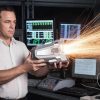 Nigel Farage announces his decision to stand as an MP during a UK reform press conference on Monday. Photo: HENRY NICHOLLS/AFP
Nigel Farage announces his decision to stand as an MP during a UK reform press conference on Monday. Photo: HENRY NICHOLLS/AFP
Nigel Farage's decision to stand as an MP could help Reform Britain overtake the Tories in the polls.
A poll conducted in February assessing the potential impact of his return showed the party falling to 19% among the general public. percentage preference up to 25 percent. At the time, the Tories had 20 per cent of the vote.
Polls in Clacton suggest Mr Farage will win the seat. Anthony Mack, the previous Reform candidate, was expected to come third behind the winning Tories with 38 per cent of the vote and Labor with 30 per cent of the vote.
However, a Survation poll in January suggested that if Mr Farage stood as a Reform candidate in the constituency, he would win 37 per cent of the vote, putting him ahead of the Conservatives on 27 per cent and Labour on 23 per cent. /p>
Giles Watling, the Conservative candidate, secured a majority of more than 24,000 after winning 72 per cent of the vote, meaning Mr Farage would overturn one of the Tories' biggest votes.
Even before Mr Farage's announcement, Rishi Sunak was worried that his party would be squeezed on two sides, with the right leaving to join reform and the left turning to the Liberal Democrats or Labour.
This helps explain , why the Prime Minister is campaigning in Tory-controlled constituencies, making every effort to retain them, rather than to take seats from Labour.
The prospect of Mr Farage running in a Tory constituency will not only increase the likelihood of a resounding defeat on election night, but will also boost the media profile of the Reform Party over the next four weeks of the election campaign.
Mr Farage will be given much more airtime time in the broadcast media — by far the most important way to gain momentum.
He could also appear as the Reform UK party representative in Friday's BBC election debate, which pits Britain's seven main parties against each other.
TV debates can sometimes change the mood of the electorate: as evidenced by the “Cleggmania” experienced by the Lib Dem leader in 2010. The party saw a surge in support after Nick Clegg impressed in the leader's debate.< /p>
If he attends, Mr Farage could also use the event to accuse Mr Sunak of being scared of the threat of reform in Britain — the Prime Minister has already said he will not appear.
Penny Mordaunt will run for the Tories and Angela Rayner for the Labor Party.
Mr Farage is also hoping his increased involvement will lead to a further boost to Reform UK's popularity in the polls.
The Reform UK party has been on the march for the past 18 months, according to a Telegraph poll.
When Mr Sunak took over as Prime Minister in October 2022, the party's share stood at around 4 per cent in the polls, well behind the Lib Dems.
His appointment gave the party a clear boost — within three months it had reached 6 percent and remained at this level for nine months.
The party experienced a sharp rise last autumn, reaching 10 percent by February when they overtook the Lib Dems.
It culminated in early April, just weeks before the election was called, at 12.5 percent.
They have since fallen to 11 percent as some voters switched back to the Conservatives.
< p>British reform strategists hope Farage's new role will help turn the tide.
However, with a first-past-the-post voting system, winning a seat in Parliament will be a difficult task even for anyone. known as Mr Farage.
Although he managed to be elected to the European Parliament, he never succeeded in an election at Westminster — despite no fewer than seven attempts.
His the first attempt was at the Eastleigh by-election in 1994, where he stood for the Ukip Party and received just 952 votes, losing his deposit and finishing just ahead of Screaming Lord Sutch of the Monster Raving Loony Party.< /p>
He stood for the next three general elections — in Salisbury, Bexhill and Battle and South Thanet. He failed to secure more than 8 per cent of the vote in any of the three.
He performed slightly better in the Bromley and Chislehurst by-elections in 2006, and in 2010 he stood against John Bercow, Speaker of the House communities at the time in Buckingham, where he polled 8,410 votes, hours after being involved in a plane crash on election day.























































Свежие комментарии